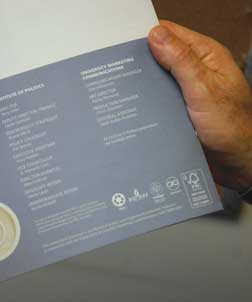Saving Our Trees: Pitt Print Shop Gets Official Stamp of Approval From Nonprofit That Safeguards Forests
 Pitt’s print shop is finishing its first FSC-logoed product—a Pitt Institute of Politics policy brief on primary care in Pennsylvania.
Pitt’s print shop is finishing its first FSC-logoed product—a Pitt Institute of Politics policy brief on primary care in Pennsylvania.From the Pitt print shop’s location in the caverns of the Cathedral of Learning basement, its connection to an idyllic forest is unapparent. But the University’s in-house producer of magazines, conference programs, brochures, business cards, and a range of other goods recently committed to help protect those unseen arboreal expanses by officially joining a supply chain that starts with sustainable forestry.
A five-year certification from the Forest Stewardship Council (FSC) means that much of the University Marketing Communications (UMC)-run print shop’s paper supply and final products fall under the global nonprofit’s exhaustive monitoring of certified tree-dependent industries, from the logging site to the final product, in an effort to safeguard forests. It also means that the University and its customers can finally make Pitt’s role in forest preservation known, said Dan Murphy, purchasing administrator for the print shop.
“The Pitt print shop has used FSC-certified vendors for years,” Murphy said. “But with our own certification, we can now publicly tell the University community that we are trying to be environmentally friendly and use paper from forests that are responsibly managed.”
Of the roughly 140 tons of paper Pitt’s print shop uses each year, approximately 70 percent of it is FSC certified, Murphy said. This means certified timber companies operate in the most sustainable way possible and that certified vendors keep to those standards when purchasing and distributing paper. The FSC upholds certification through tracking numbers and frequent audits of operations.
Although Pitt was plugged into the FSC supply chain before certification, there was no formal acknowledgement of or direction to the print shop’s forest friendliness, Murphy said. (The print shop’s other eco-steps include using soy-based ink—about a ton a year—for most jobs as well as recycling scrap paper and polyester printing plates, Murphy said.) A push for sustainability initiated by Pitt Chancellor Mark A. Nordenberg prompted Murphy and UMC to undertake the five-month FSC certification process, which carries a $3,600 certification fee (for auditor expenses) and a $1,500 annual fee.
With FSC certification comes an audit every year to make sure the Pitt print shop remains a responsible consumer of paper. A tracking number included with every outgoing order means that print shop customers also can verify via the FSC Web site that Pitt is in good standing with the organization. At the same time, Pitt can keep the same tabs on companies it receives paper from, Murphy explained.
Most important to the print shop’s green-minded clientele is that materials can now be affixed with the FSC certification logo, at the customer’s request—a public acknowledgement only certified companies can provide, Murphy said. Even that small logo is subject to FSC approval of the products that can include it and the type of ink used, he said. At the time of each audit, the print shop has to compile a packet for each project featuring the logo so that the FSC can vouch for the product’s adherence to the organization’s guidelines.
“The process takes less time as we get more experienced with it, but it did seem daunting at first,” Murphy said. “It seemed like a lot of extra work, and in some ways it is, especially at the design and preparation stage, but the payoff for the environment is worth it.”
More information on FSC certification is available on the organization’s Web site at www.fsc.org. Pitt’s certificate is available at http://bit.ly/kl4th5.
Other Stories From This Issue
On the Freedom Road

Follow a group of Pitt students on the Returning to the Roots of Civil Rights bus tour, a nine-day, 2,300-mile journey crisscrossing five states.
Day 1: The Awakening
Day 2: Deep Impressions
Day 3: Music, Montgomery, and More
Day 4: Looking Back, Looking Forward
Day 5: Learning to Remember
Day 6: The Mountaintop
Day 7: Slavery and Beyond
Day 8: Lessons to Bring Home
Day 9: Final Lessons

